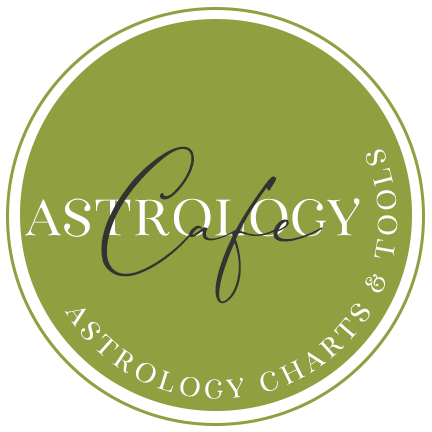The Houses
Meanings, Keywords, & Key Phrases of the Houses
This page can help students of astrology by jumpstarting their brains when analyzing charts. Key words and key phrases for planets, points, aspects, houses, signs, and more are useful aids for interpreting a chart.
In astrology, there are different levels of interpretation to each factor (in this case, houses): psychological, external, and physical.
The First House
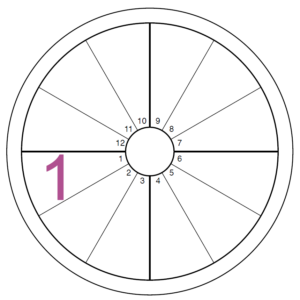
The 1st House of the Chart
The first house of the horoscope plays a pivotal role, acting as a powerful point where you, the individual, intersect with and meet the world. It’s not only a symbol of your outer personality, but it also reflects your self-awareness, the projection of your personality to the world, and your unique way of interacting with it. This house governs your physical body, including the qualities of physical heat, aura, and vitality, making it a crucial aspect of your astrological profile. This house, especially when combined with the Ascendant, reveals how others perceive you.
Physiological factors and physical characteristics, such as a person’s gait, are part of the personality the first house projects to their environment. Their mannerisms and fundamental temperament also come under this house’s domain. A person’s appearance, trademarks, and personal identity are defined by this sector of the chart. The first house rules the head and face more specifically.
Simultaneously, this house represents your initiative–your initial impulses, instincts, and reactions. What’s your very first reaction to starting something new? How do you respond to a new situation, and what’s your instinctive approach? The first house condition helps answer these questions. The early environment plays a significant role in shaping first-house characteristics, emphasizing the importance of self-reflection and awareness, as many of these characteristics are automatic.
The signs, associated planets, and general condition of the first house help define your sense of independence, individuality, spark, persona, and personal essence.
Key words and key phrases: Self-image, the image we project to others, the first impression we make, how we start things, our defense mechanisms, our relationship with our immediate environment, our general outlook on life, physical appearance, first attitude towards the outside world, starting something new, vitality, personality, health, the head, gestures and manners, our body ego, the outer form, how others see us, how we come across, the “vibes” we give off, early conditioning, adaptability, outlook, physical characteristics, natural disposition, self-interest.
To understand more about the first house, see also Signs on the 1st House (for example, the meaning of having Taurus on the 1st house cusp) and Planets in the Houses (for example, if you have Saturn in the 1st house), and Rulers of the 1st House (for instance, if you have Aries on the 1st house, then you can explore the meaning of its ruler, Mars, in the houses).
The Second House
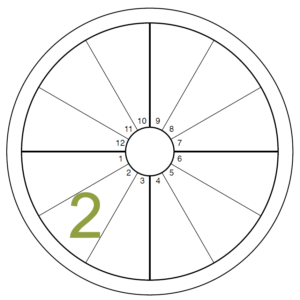
The 2nd House of the Chart
The second house of the horoscope symbolizes your relationship with your things–what you own, collect, and build. For instance, if you have a collection of rare coins, that would be represented by this house. Money, belongings, and material goods fall under the domain of what you have, hold, or possess. This house also governs how you make yourself feel secure, comfortable, and safe. For example, if you feel secure when you have a certain amount of money in your bank account, that would be reflected in this house.
Think of the second house as a treasure trove in your natal chart. It’s not only about your personal income and resources, but also about your unique talents and assets. This is the place where you learn to appreciate the beauty of what you have, the natural world around you, and the sensory experiences that enrich your life.
How do you support and sustain yourself? What’s your relationship with your personal belongings? Do you take good care of them? How do you handle your money? What defines your self-esteem or sense of self-worth? Can you rely on yourself? These are the questions that the second house can help answer.
Certainly, how you use your resources, such as money, talents, time, energy, and physical things, can say a lot about your sense of personal power and self-respect. The second house reveals what you cherish and value most.
It also shows how acquisitive you are–for example, do you enjoy collecting things, or are you slow to acquire new objects? Do you gravitate to higher-quality, shinier, new-fangled, unusual, or long-lasting things? How important is it to you to establish yourself or build something that will last? Of course, this house can also reveal issues of greed or overindulgence. For instance, if you find yourself constantly acquiring new things without considering their value or if you’re overly attached to your possessions, it could be a sign of imbalance in your second house.
Parts of the body and health matters ruled by the second house include the throat and neck and the systems and associations with these things, such as the thyroid, parathyroid and metabolism, the voice, and the tonsils and immunity.
The signs, associated planets, and general condition of the second house help define your value system and self-worth.
Key words and key phrases: “I have,” money and personal finances, sense of self-worth and basic values, personal possessions, monetary prospects, speech, the throat, the nape of the neck, our ability to provide for ourselves, security needs, how we handle matter, materials, spending habits, our attitude towards possessions, the degree of our generosity, sensual pleasures, nature, our belongings, tangibles, our attachment to our values (the degree to which we are faithful to our values).
To understand more about the second house, see also Signs on the 2nd House (for example, the meaning of having Capricorn on the 2nd house cusp) and Planets in the Houses (for example, if you have Jupiter in the 2nd house), and Rulers of the 2nd House (for instance, if you have Virgo on the 2nd house, then you can explore the meaning of its ruler, Mercury, in the houses).
The Third House: Communication
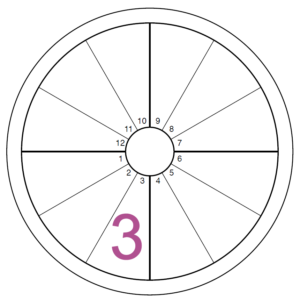
The 3rd House of the Chart
The third house in your birth chart is a deeply personal realm, encompassing your communications, learning, and connections. It mirrors your early relationship with your environment, a time when you began to understand others and the world around you. This house also reflects your experiences during the elementary school-age period, shaping the type of education you received and the information you consumed. These formative experiences are not only memories, but integral parts of your adult life and personality.
The third house wields a practical influence over your life, governing your relationships with siblings or close relatives, classmates, and neighbors. It also rules over short trips, transit, and transportation, including the devices or systems you use to connect with others or nearby places, such as cars, bikes, phones, and computers. Letters, emails, texts, wires, and other forms of connection and communication are also under its rule. Understanding your third house can empower you to navigate these aspects of your life more effectively.
This house represents your wakefulness, lower mind, and automatic learning methods–the ways you naturally absorb information and learn without conscious effort. As the opposite of the ninth house, the third house is about your neighborhood and familiar environments as opposed to faraway places, and it relates to the absorption of facts, figures, and the mind’s computations rather than higher or more abstract levels of thinking. With this house, you’re studying, relaying and gathering information, exchanging ideas and information tidbits, processing, inquiring, sorting, differentiating, corresponding, and questioning. It’s your fundamental common sense.
The third house, with its key phrase ‘I think,’ represents your day-to-day thinking and processing, personal interests, and contacts. The adjustments, accommodations, and adaptations you make to your environment are influenced by this area of your chart. How curious are you about your close environment and the people in it? How interested in sharing ideas or being on the move, doing errands, and connecting are you? Are you easily distracted or nervous? These are the questions astrologers look to the third house to answer, ideally sparking a deeper understanding of your own interests and behaviors.
Parts of the body and health associations of the third house include fingers, hands, shoulders, arms, oxygenation, the lungs, nerves, speech, mental or learning difficulties, and the conscious mind.
Key words and key phrases: The lower mind, communication, interactions in our immediate environment, social adjustment, siblings and early environment, neighbors, thoughts, short trips, writing and speaking, how we formulate our thoughts, language skills, media and communications, our practical thinking, how we classify and examine information, trade, superficial or light conversation, making connections, our need to hear news (and/or gossip) and for spreading news, mental dexterity, lungs, airways, hands, letters, emails, documents, telephones, brothers and sisters, elementary education, the neighborhood, everyday mental chores and mental activities, mode of transportation, means of transportation, getting from point A to point B, speech, walking, driving the car, the written word, visiting.
To understand more about the third house, see also Signs on the 3rd House (for example, the meaning of having Virgo or any other sign on the 3rd house cusp) and Planets in the Houses (for example, if you have Venus or any other planet in the 3rd house).
The Fourth House: Family, Home, Roots & Security
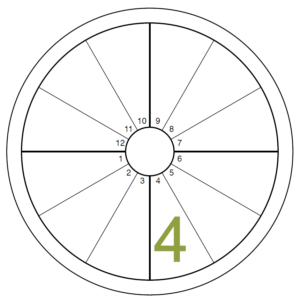
The 4th House of a Chart
The fourth house of your natal chart symbolizes your foundations and roots. It’s where and how you find your center. In this house, you strive for integration, wholeness, security, and safety. It rules the subjective part of you–your unexpressed feelings, early childhood experiences, soul history, and inner world.
The fourth house of the horoscope is not only about the physical home; it’s about the concepts of safety, warmth, and nurturing. It governs your heart, core, and basic rhythm–your gut feeling. This house reflects your emotional landscape, your relationship with your parents, and your family dynamics, all of which play a significant role in shaping your life.
Your family life and background are described by the condition of your fourth house. In fact, you might say that you need to deal with and heal problems related to the fourth house, representing the source or origin, before making significant headway in your life. This could involve acknowledging and processing past traumas or negative family patterns. This sector of your chart can reveal parental or familial conditioning and early experiences you’ve carried with you. It also rules your birthplace and those things you’ve inherited from your parents. Understanding these influences can help you identify and work through unresolved issues.
What are your uncensored feelings and automatic responses or instincts? How easily do you put down roots? How do you feel about family or tradition? Do you easily feel homesick, or do you feel freer when away from home? How do you fill your emotional well? What makes you feel safe and secure, and how do you create a feeling of safety? How do you prefer to live? How important is building your nest to you? What’s your nurturing style? The condition of the fourth house by sign, ruler, and planets within can help answer such questions.
As the opposite of the tenth house of responsibilities to the outer world, the fourth house is about attachment, dependency, nurturing, emotional goals, retreat, passivity, and developing roots. It rules what we find familiar or safe, a sense of belonging on a fundamental level, unconditional love, and protection. Before heading out to achieve something in the outside world, it’s in the fourth house that we establish a solid base.
The parts of the body and health matters associated with the fourth house include the breasts, stomach, lymphatic and interstitial fluids, hormonal imbalances, and weight fluctuations. Some imbalances, fixations, or issues in these areas could be related to emotional factors or family dynamics. For example, ‘eating our feelings’ can relate to this house, suggesting that emotional eating might be a coping mechanism related to unresolved issues from early experiences.
Key words and key phrases: Our psychological foundations and roots, family, home life, instinctive behavior, the mother or the more “maternal” parent/caregiver, ancestry, upbringing, our connection with our past, our sense of security, domestic life, real estate, land, property, the birthplace, old age, home base, the source, familiarity, attachment, dependency, private life, nurturance, emotional nourishment.
To understand more about the fourth house, see also Signs on the 4th House (for example, the meaning of having Libra or any other sign on the 4th house cusp) and Planets in the Houses (for example, if you have Mars or any other planet in the 4th house).
The Fifth House: Self-Expression, Creativity, Pleasure, & Romance
The fifth house is a succedent house. Its natural sign ruler is Leo and its natural planetary ruler is the Sun.
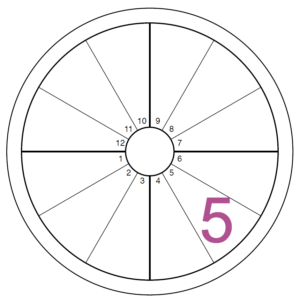
The 5th house of the chart
In house five of your natal chart, you channel your unique personal energies into the world. It’s where you create, share, and express yourself through play, entertainment, pleasure, leisure, and romance. What you do in this area of your birth chart is imprinted with your personal style or personality. You stand out as a unique individual.
The fifth house is a realm of joy and pleasure, encompassing recreation, dating, romance, your creations (including children), gambling or speculation, hobbies, pleasure-seeking activities, creative activities, entertainment, and leisure. It unveils how you perceive, seek, share, and pursue pleasure. In this part of your chart, you seek your joy and discover your bliss.
It’s also a place where you perform and seek positive feedback, validation, or applause. Note that romance and dating fall under the rule of the fifth house, while other houses govern other forms of relationships and deeper commitments. Essentially, the fifth house is a house where we interact with others on an ego level–where our associations may reflect ourselves. This house is associated with the human stage of development of the teenager–a stage when we’re finding ourselves and our experiences are dramatic.
The condition of the fifth house reveals much about how readily you take a risk or gamble, in what areas of life you’re more inclined to do so, and with what kind of style. It also shows your fertility, which includes your creative potential and ability to bring new things into the world. This house rules adornments, embellishments, costumes, and vivid expressiveness. Physically, it has connections to the heart.
Key words and key phrases: Creative self-expression, pleasure and entertainment, all forms of “play”, speculation and gambling, pastimes, hobbies, attitude towards romance, romantic relationships, lovers as opposed to partners, validation, pride, ego, fame, the heart, attitude towards having fun, drama, adornments, and costumes.
To understand more about the fifth house, see also Signs on the 5th House (for example, the meaning of having Sagittarius or any other sign on the 5th house cusp) and Planets in the Houses (for example, if you have Pluto or any other planet in the 5th house).
The Sixth House: Work & Health
The sixth house is a cadent house. Its natural sign ruler is Virgo and its natural planetary ruler is Mercury.
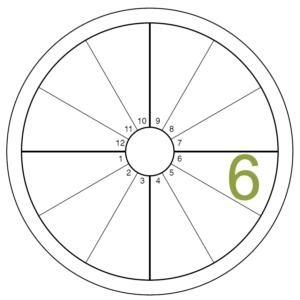
The 6th house of the chart
The sixth house of your chart represents your personal growth through your daily affairs, day job, services, chores, habits, health, and routines. It’s how you care for your body through nutrition, fitness, and other self-care efforts. This house also shows how you handle details and everyday problems. You create order, organize things, and contain chaos in this area of your chart.
The sixth house also describes your approach to work, your relationship with co-workers, and the adjustments you make to your working environment. It reveals whether or not you readily serve others, such as through employment, and your style of doing so. Do you enjoy helping others? The sixth house condition also reveals how you treat those who serve you (such as your employees or waitpersons).
Your health is under the rule of the sixth house, although the first house also helps define matters related to vitality and the physical body. How do you approach maintaining and improving your health and wellness? The sign on the cusp sometimes points to parts of the body that are a little more vulnerable to illness or need special care and attention.
In this house, you might find the tendency to fret, worry, and fuss, which can impact health. Self-esteem matters certainly can relate to every house of the horoscope, but the specific type of insecurities related to the sixth house often involve guilt complexes, imposter syndromes, difficulties living up to perfectionism, and fear of advancement.
However, there can instead be contentment with a subordinate position or great joy in service. Not everyone strives to get ahead or to take a top position, and the assumption that low self-esteem must be associated with this temperament is erroneous.
The sixth house also describes your everyday routines and habits. It reveals whether you like to keep busy and be productive, prefer a structured daily environment, or intuit your way through your chores and your day. Self-improvement efforts are ruled by this house. Interests in nutrition and fitness can be found here. This house rules your food tastes and eating habits, and even how adventurous you are with food.
Key words and key phrases: “I work,” work and job (as opposed to career), techniques and methods, daily life, order, self-improvement, health, nutrition, attitude towards food, service, attitude towards service and co-workers, helpfulness, pets, attitude towards routine and organization, how we refine and perfect ourselves, aptitudes, attention to health (including dysfunctions in this area, such as hypochondria), kindred on the father’s side, servers, helpers, inherited health conditions, methods and systems, small animals, diet-related illness, the intestines.
To understand more about the sixth house, see also Signs on the 6th House (for example, the meaning of having Scorpio or any other sign on the 6th house cusp) and Planets in the Houses (for example, if you have Neptune or any other planet in the 6th house).
The Seventh House: Partnership & Marriage
The cusp of the seventh house in many (although not all) house systems is a special angle called the Descendant (DSC).
The seventh house is an angular house, indicating activity. Its natural sign ruler is Libra and its natural planetary ruler is Venus.
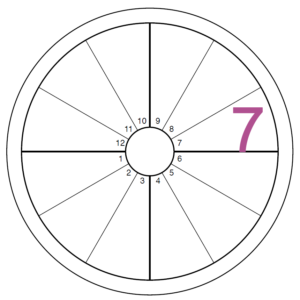
The 7th house of a chart
The seventh house is the sunset position and represents cooperative relationships, such as partnerships. It indicates the need to blend and harmonize your personality with others, specifically one person.
Partnerships can be marriages or similar, business-related, or social connections. These connections may or may not be loving in nature, but they must involve sharing and having a vested interest in one another. This house rules your one-to-one interactions and how you negotiate and compromise. Joint ventures come under its rules, and so do open confrontations! While the twelfth house shows hidden enemies, the seventh house shows open adversaries. These can be enemies or pleasant opponents.
The sign on the cusp of this house can describe qualities you seek in a partner or close relationship, and if there is dysfunction, emphasizing the more constructive qualities of the sign can help, as could de-emphasizing the destructive characteristics. Planets and bodies within this house point to your conscious dependencies on others. You seek to understand yourself through others in the seventh house. How influenced are you by others? The seventh house has clues.
This house of the chart not only reveals what you seek from a partner, but it also rules contracts, legal matters, and counseling. It indicates how we naturally approach making peace or creating harmony and balance in our lives.
Key words and key phrases: Companionship, the alter ego, partnerships, one-to-one relationships, marriage, the first marriage, the “significant other”, business partnerships, competitors, opponents, open enemies, our “shadow self”, lawyers, mediators, counselors, contracts, how we deal with peer pressure.
To understand more about the seventh house, see also Signs on the 7th House (for example, the meaning of having Aquarius or any other sign on the 7th house cusp), Planets in the Houses (for example, if you have Saturn or any other planet in the 7th house), and Rulers of the 7th House (for instance, if you have Taurus on the 7th house, then you can explore the meaning of its ruler, Venus, in the houses).
The Eighth House: Transformation & Sexuality
The eighth house is a succedent house. Its natural sign ruler is Scorpio and its natural planetary ruler is Pluto.
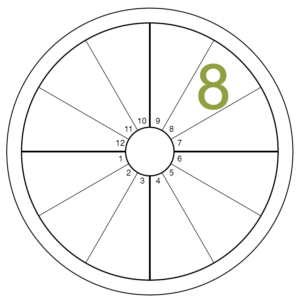
The 8th house of a chart
The eighth house, a realm of transformation, unveils your perspectives on intimacy, shared resources, power, and change. It governs your joint resources and shared assets, as well as debts, dependencies, taxes, shared bank accounts, legacies, inheritances, and the concept of death. This house describes how you confront crises and upheavals, emerging transformed on the other side.
The eighth house is a sanctuary for exploring your deeper, perhaps hidden desires and personal motivations or psychology. It’s a place where you discover your need for complete immersion in a relationship or pursuit. Passion projects, research, investigation, and other forms of deep exploration are the activities of the eighth house. While the more playful sexual activities that are largely about the ego rather than true sharing might be best described by your fifth house, the eighth house is the realm of intimacy and deeper sexual connections.
The eighth house reveals your attitudes toward sharing yourself intimately and your resources, including money, with others. Its opposite house, the second, rules your personal income. The eighth house, on the other hand, rules assets shared or received by others, such as through support or inheritance. As the second house of the seventh house, it represents the assets of a partnership. It’s how you might manage or make use of others’ talents and resources. This area of your chart also describes how you deal with power dynamics or share power in a close relationship.
The eighth house is the realm of death and rebirth, where you shed the self-centered ego and merge yourself and your possessions with another. It’s not about final endings, but about the death of something that paves the way for something new. Exploring this house can provide insights into your ability to trust a partner or a cause. Fears of betrayal or loss of self through a relationship can manifest in this house, for instance.
Key words and key phrases: Transformation and crisis, our attitude towards crisis and change, sexuality, sex, death and rebirth, personal growth and transformation, regeneration, our partner’s resources, addictions, psychology, others’ money, taxes, divorce/alimony, inheritance.
To understand more about the eighth house, see also Signs on the 8th House (for example, the meaning of having Sagittarius or any other sign on the 8th house cusp) and Planets in the Houses (for example, if you have Pluto or any other planet in the 8th house).
The Ninth House: Belief Systems & Higher Learning
The ninth house is a cadent house. Its natural sign ruler is Sagittarius and its natural planetary ruler is Jupiter.
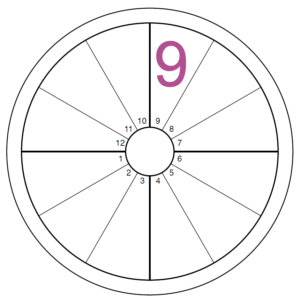
The 9th house of a chart
The ninth house is about finding meaning in our experiences. While we collect knowledge in the third house, in the ninth, we process and seek to understand what we’ve learned. It rules your journeys, especially long ones, such as by plane or boat, as well as learning journeys or experiences.
As such, this house encompasses both travel and armchair travel–whatever takes you away from the ordinary to expand your mind, horizons, and experiences on physical, mental, and spiritual levels. Your religion and belief systems also come under the category of “journeys.”
The ninth house is the domain of your ideas, the meanings you assign to your experiences, and your personal truths. It’s where you establish your relationship with the universe, your openness to understanding and embracing higher principles and concepts, and your quest for truth. By studying your ninth house, you can discover how you feed your spirit and mind, embrace new adventures, and evolve as a person.
The ninth house governs a wide range of subjects, including the courts of law, judgments, philosophy, and the dissemination of ideas through promotion, broadcasting, and publishing. It also reveals your concept of right and wrong, abstract thinking, relationship with your in-laws, and pursuit of higher education. This house reflects your evolving optimism, faith, outlook, and worldview, shaped by your connections with others. The ninth house also rules mind-blowing experiences, ‘seeing the light,’ and other similar revelations, as well as the means by which you attain these more rounded perspectives and states of mind.
The condition of your ninth house can have significant implications. A challenging ninth house may indicate fanaticism, difficulties with travel or challenges abroad, using ideas for personal gain or power, and impaired learning. On the other hand, a healthier ninth house can point to truth seekers, guides, explorers, teachers, and philosophers. Understanding the condition of your ninth house can provide valuable insights into your life path and potential challenges or strengths.
Key words and key phrases: Our personal belief system, our sense of adventure, exploration, religious beliefs and personal philosophy, higher education, long-distance travel, morals, foreign languages and cultures, personal truths, publishing, commerce.
To understand more about the ninth house, see also Signs on the 9th House (for example, the meaning of having Aquarius or any other sign on the 9th house cusp) and Planets in the Houses (for example, if you have the Sun or any other luminary/planet in the 9th house).
The Tenth House: Career/Profession, Responsibility, Reputation, & Standing
The cusp of the tenth house is a special angle called the Midheaven (MC).
The tenth house is an angular house. Its natural sign ruler is Capricorn and its natural planetary ruler is Saturn.
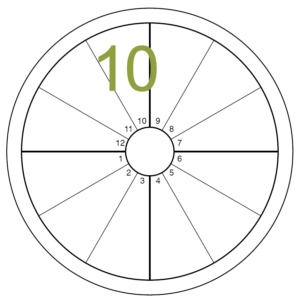
The 10th house of a chart
The tenth house is your office, position, status, or place in the community. It represents actualization and what you give back to society in concrete terms. For instance, a person with a strong tenth house might be a successful businessperson, a respected community leader, or a dedicated public servant. Your responsibilities, career, and reputation fall under this domain.
The tenth house, a mirror to your relationship with authority, reveals how you assume positions of authority or how you interact with those in power, be it teachers, elders, or bosses, depending on your life stage. How do you handle responsibilities? What’s your relationship with the rule-making parent? How do others’ (or societal) expectations of you affect your journey? How much of an impact do you want to make on others? What’s your relationship with fame or honors? Do you crave recognition for your work or performance?
This house represents your higher aspirations on a practical level. It also shows how you catch the public eye. Your life path and longer-range goals fall under the rule of the tenth house. Its condition reveals your calling, ambitions, and the degree of worldly success you may receive. It shows how you deal with scrutiny, attention, and matters of status or reputation. The tenth is a house of public life, honors, achievements, and awareness of how you come across. While the fourth house represents what you’ve inherited, the tenth house is where you’re heading or aspiring toward.
Key words and key phrases: Career and profession, contribution to society, position in society, social standing, reputation, material success and position, how we carve out an identity for ourselves, achievement, authority figures, paternal figures, the father or most “paternal” parent/caregiver, bosses, governments, zenith, power, privilege, prestige, attitude towards responsibility, attitude towards abiding by the law, desire for achievement.
To understand more about the tenth house, see also Signs on the 10th House (for example, the meaning of having Libra or any other sign on the 10th house cusp), Planets in the Houses (for example, if you have Jupiter or any other planet in the 10th house), and Rulers of the 10th House (for instance, if you have Gemini on the 10th house, then you can explore the meaning of its ruler, Mercury, in the houses).
The Eleventh House: Aspirations & Personal Goals, Groups
The eleventh house is a succedent house. Its natural sign ruler is Aquarius and its natural planetary ruler is Uranus.
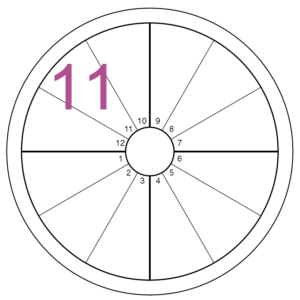
The 11th house of a chart
The eleventh house is your connection with society and the community. It’s about cooperation, friendship, and communal or humanitarian pursuits and feelings. This house rules your friendships–relationships of a social or intellectual nature. It reveals how you connect with peers, associates, contemporaries, and acquaintances.
Groups and associations with groups fall under the eleventh-house domain. These connections generally form due to common goals or interests. This house is where you find the power of the group, the community, or a cause. It describes your social circle. In some ways, it’s about the results of your tenth-house achievements and what you do with your time when not fulfilling your responsibilities. However, it differs from the recreational and creative fifth house mainly because the eleventh house is about cooperating and working for the common good rather than one’s ego fulfillment.
The condition of this house reveals the kinds of friends you attract and the groups or causes you gravitate to. Your group experiences are revealed in this area of your chart. How important is it for you to feel a sense of kinship or shared values with others? How well do you cooperate with others toward a common goal or function in a team? The eleventh house is about our equals and treating others as such.
While the seventh house shows how we relate to others one-to-one, the eleventh is about how we relate to groups of people. While the fifth house is about how we stand out as unique and special, the eleventh house is where no one is more important than the other–it’s about the community spirit rather than the competition. In other words, the fifth house is about individuality and self-expression, while the eleventh house is about collective action and cooperation.
The eleventh house of your chart also rules your happiness goals and pursuits. It’s about the activities that help you pursue your hopes and dreams, the wishes and paths you take minus the pressures or expectations we found in the tenth house. This house is where you can truly focus on what makes you happy and fulfilled, without the constraints of societal or professional responsibilities.
Key words and key phrases: Acquaintances and friends, groups, organizations, hopes, wishes, aspirations, personal goals, our sense of our true inner purpose, our sense of the group, humanity.
To understand more about the eleventh house, see also Signs on the 11th House (for example, the meaning of having Leo or any other sign on the 11th house cusp) and Planets in the Houses (for example, if you have the Moon or any other luminary/planet in the 11th house).
The Twelfth House: Soul Growth & Undoing, Privacy & Secrets
The twelfth house is a cadent house. Its natural sign ruler is Pisces and its natural planetary ruler is Neptune.
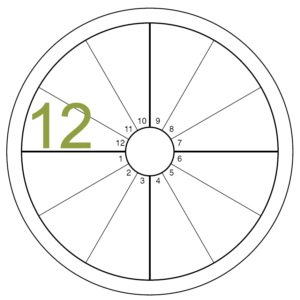
The 12th house of a chart
The twelfth house rules endings, seclusion, retreat, mental or emotional health, and karma. It encompasses the subconscious mind, sacrifice, purification, and acceptance.
In the twelfth house, you can withdraw, replenish yourself, heal, and tie up loose ends. You can also experience anguish, guilt, denial, avoidance, escapism, and confinement. When we’re our own worse enemies or self-sabotaging, it’s a twelfth-house issue. Past lives, silent suffering, and repressed matter come under this domain. It’s not a place of clarity or straightforwardness. For instance, while it can be a house of closure, sometimes, things are left undone and need you to close them by accepting the lack of clarity. This house also rules hidden enemies (open enemies are ruled by the seventh house!).
The twelfth is a house of secrets, shadows, hidden things, dreams, and boundlessness. While you can most certainly look to this house for hidden problems and struggles, it’s also a place to find hidden strengths. It represents your soul’s growth through service, challenges, and limitations. Here, you’ll connect with your compassion, understanding that struggles can be a part of your personal growth journey.
How do you deal with endings? How do you manage the ghosts of the past or unanswered questions in your life? Do you readily make sacrifices for others? How do you feel about doing things behind the scenes or anonymously? What do you keep under the surface or tucked away, hidden from others and perhaps hidden from yourself? The condition of your twelfth house can answer these questions.
Challenges in the twelfth house can manifest on a physical level, potentially affecting the body through conditions such as autoimmune disorders, issues with the lymphatic system, or problems with the feet. This connection between the twelfth house and physical health underscores the holistic nature of astrology, where the mind, body, and spirit are all interconnected.
Key words and key phrases: That which is hidden or below the surface, karma, self-undoing, soul growth, hidden strengths and hidden weaknesses, dreams, private affairs, lost items, hospitals and prisons, spiritual studies.
To understand more about the twelfth house, see also Signs on the 12th House (for example, the meaning of having Cancer or any other sign on the 12th house cusp) and Planets in the Houses (for example, if you have Uranus or any other luminary/planet in the 12th house).
Don’t know the positions of your planets? Be sure to find out your personal astrology positions and placements online, at no cost.
See Also:
Off site, see the excellent guide to the houses by AstroStyle.
